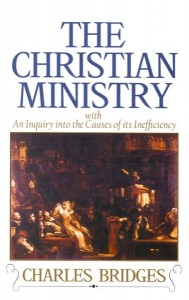Yesterday I gave you the first eight wishes of George Swinnock, a forgotten Puritan, regarding a faithful ministry.
If you are a pastor, I encourage you to pray that God would make these things true in your ministry. If you are a church member, I encourage you to pray that God would make these things true in your pastor’s ministry.
8 [MORE] WISHES ABOUT THE PASTOR’S CALLING
- A Prudent Preacher. “I wish that I may prepare for preaching the gospel diligently, ever handle this weapon warily, deliver the message of my God soberly, as may be most for his glory and my people’s good, not with the enticing words of man’s wisdom, but in the demonstration of the Spirit and power.” “I wish also that I may preach over every sermon to my own heart before I preach them to my hearers; that I, preaching feelingly, may preach more effectively.” “I wish that I may preach a crucified Savior in a crucified style.”
- A Ceaseless Intercessor. “I wish that all my congregants, without exception, may have so deep a share in my affection, upon a religious account, that without ceasing I may make mention of them always in my prayers; that my heart’s desire and prayer to God, both in private and public, for poor and rich, may be, that they may be saved.”
- A Patient Instructor. “I wish, that should my labors prove unfruitful when I am faithful in the discharge of my trust, that I may not be discouraged, knowing that I shall be a ‘sweet savor to my God.'”
- A Discerning Judge. “I wish, that in the administration of the sacraments, I may have an impartial regard to the fitness and meetness of the subjects, lest I set those precious seals of the covenant of grace to blanks, where by they should signify nothing, especially about the Lord’s Supper.”
- A Faithful Shepherd. “I wish that, like a faithful shepherd, I may often visit my flock, and warn every one night and day with tears.”
- A Powerful Example. “I wish that I may be as John the Baptist, both a burning light in my sermons, and a shining light in my conversation, lest my works give the lie to my words.” “Oh that I might preach as powerfully by my life as by my lips.”
- A Humble Instrument. “I with that . . . when God has enabled me by his Spirit to cast down imaginations and high things that exalted themselves against the knowledge of him, and to bring into captivity many sinners to the obedience of Christ, that I may set the crown of glory upon the head of God alone, and not suffer the least part of his honor to stick to my fingers.”
- A Watchful Overseer. “I wish that I may take heed to myself, my doctrine, to my life, be watchful in all things, endure affliction, make full proof of my ministry, do the work of a faithful pastor.”









